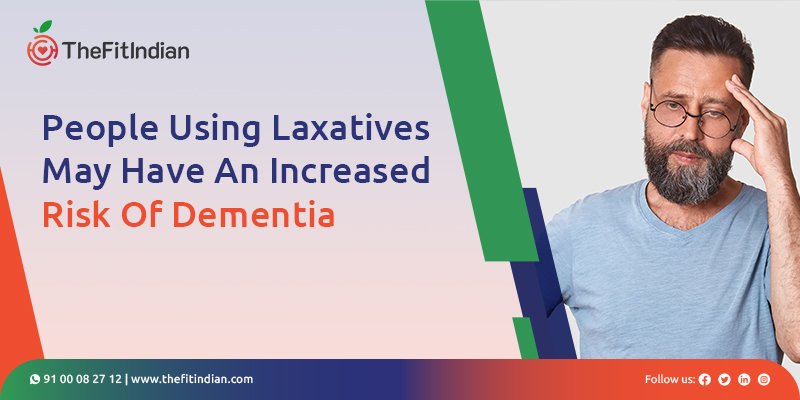People using laxatives may have an increased risk of dementia, why?
Reviewed by: Dr. T S Deepthi Sarojini | Author: Manoja Kalakanti
Regular laxative usage has been linked to a higher risk of acquiring vascular dementia and dementia. A higher risk was associated with using osmotic laxatives or taking multiple laxatives. The most recent study only demonstrates a correlation between the use of laxatives and dementia; it does not imply that dementia disease is necessarily brought about by laxative abuse. However, go through the constructed blog in detail to understand the subject.
Understanding laxatives in detail:

Constipation is typically diagnosed if you have trouble emptying your intestines and have less than three stool motions per week. Constipation that lasts for a few weeks or longer is known as chronic constipation because it causes irregular bowel movements and difficulty passing stools. Laxatives are drugs that cure constipation by causing bowel motions or softening feces. Before specific bowel procedures or tests, certain laxatives are also used. Pills, capsules, liquids, meals, gums, suppositories, and enemas are all laxatives. Most laxatives are designed for occasional usage. Numerous laxatives can be purchased over the counter.
Types of laxatives:
There are numerous varieties of laxatives on the market. Each with properties of its own. Some common types are:
1. Bulking agents:
These laxatives give the stools more water and volume, which helps them pass more readily through the digestive system. The average working time is between 12 and 72 hours.
2. Lubricating laxative:
Lubricant laxatives make stool slick, facilitating swift and simple transit through the intestine. They usually work for six to eight hours. One illustration is mineral oil.
3. Emollient laxative:
Allowing water and lipids to permeate the stool, these stool softeners help it pass through the digestive tract more quickly. The average working time is between 12 and 72 hours.
4. Stimulant laxatives:
These encourage the lining of the intestine to promote the movement of the stool. They should only be taken on occasion but offer extremely immediate relief.
5. Osmotic laxatives:
Osmotic laxatives pull liquids from the surrounding tissues into the intestine, softening and making stools easier to pass. They could work 30 minutes to 6 hours, depending on the kind.
How is laxative use linked to increase dementia risk?
Using laxatives to relieve constipation daily may increase the risk of dementia disease. According to research, people who routinely used laxatives had a 51% higher risk of developing general dementia than people who didn’t use the OTC drug. In addition, utilizing osmotic laxatives, or various laxatives, elevated the incidence of vascular dementia and all-cause dementia.
Even though some laxatives, such as stimulants and osmotic laxatives, aren’t advised for routine usage, they are still frequently used in this way. The gut microbiome may alter due to frequent laxative usage, which may impair nerve signaling from the stomach to the brain or increase the generation of intestinal toxins that may have adverse effects on the brain. According to research, using numerous over-the-counter or osmotic laxatives regularly was linked to an increased chance of developing dementia.
Statistically, those who took two or more types of laxatives had a 90% higher risk of dementia than those who just took one class, which elevated the risk by only 28%. Additionally, osmotic laxative users had a 64% higher chance of getting dementia than non-users of laxatives on a regular schedule. This causes a decrease in the speed of dementia treatment as well.
Owing to the fast-paced and competitive nature of this generation, there has been a decline in the intake of nutritious food. This has caused severe bowel-related issues among the working class or the middle-aged generation, hence this sudden splurge in laxatives. The intestinal barrier may become weakened because of laxative use. Some “bad” microorganisms may be able to escape the gut barrier and produce neurotoxic substances that may enter the bloodstream if the gut barrier is compromised. Additionally, it is thought that excessive use of laxatives may result in electrolyte imbalances and long-term alterations to the colon. Mild cognitive impairment can result from electrolyte imbalances, including low sodium levels, impacting a person’s mental state.
Symptoms of dementia caused by laxative intake:
Dementia symptoms are the same irrespective of the factor causing it. The most typical signs of dementia include:
- Memory loss
- Difficulty in communicating.
- Severe decline in the ability to plan and organize.
- Confusion and disorientation
- Constant metallic taste in the mouth
- Loss of smell
- Difficulty in coordinating
- Anxiety
- Hallucinations
- Mood swings
- Agitation
- Apathy
Foods That Reduce Dementia Risk:l
External factors bring on some varieties of dementia. However, there are several things you can do to reduce your chance of dementia while also keeping your general health in good shape. A heart-healthy diet is also helpful for the brain and general well-being. In addition, a balanced diet may lower your chance of developing diseases that can cause dementia. Some popular foods that are known to reduce the risk of dementia are:

1. Berries:
Studies have shown that eating strawberries, blueberries, and acai fruit has various positive effects on our brains, including better memory in youngsters as young as 8 to 10 years old and up to senior adults. According to one study, people who consumed more berries as they aged had a cognitive deterioration that was delayed by up to 2.5 years. In addition, juice made from wild blueberries was linked to better cognitive performance in those with mild cognitive impairment.
2. Coffee:
Coffee and caffeine have both been linked to cognitive advantages, including a considerably decreased risk of dementia progressing from mild cognitive impairment. Also, studies have discovered distinct benefits for working, spatial, and available memory hence helping in dementia treatment.
3. Green vegetables:
Vitamins found in leafy green veggies help to improve brain function. Eating green leafy vegetables was linked to cognitive abilities like being 11 years younger in a study of persons 58 to 99 years old. This demonstrated a lower incidence of dementia in people who consumed more folate, which is present in leafy green vegetables.
4. Chocolate:
One of the most delectable methods to lower the risk of dementia may be chocolate. Numerous studies have linked dark chocolate and cocoa to a reduced risk of cognitive deterioration. The crucial distinction is that dark chocolate, not milk chocolate, will typically provide your brain the most boost.
6. Fish:
Numerous studies have confirmed the benefits of the omega-3 fatty acids present in types of fish for maintaining brain function. Salmon, sardines, tuna, halibut, and trout are among the fish that are rich in omega-3 fatty acids. Moreover, fish is a rich source of vitamin B12 which can effectively assist in overcoming dementia side effects.
7. Cinnamon:
Including cinnamon in the diet is known to improve a person’s ability to eliminate the amyloid protein buildup in the brain associated with Alzheimer’s disease, as well as their memory and other cognitive abilities. Additionally, cinnamon has been linked to advantages for the heart and blood pressure and anti-inflammatory and antioxidant properties linked to enhanced brain function.
8. Turmeric:
Enjoy curry? It has been shown that curcumin strongly correlates with halting cognitive aging and treating people with dementia. However, one issue with humans is that curcumin is frequently tricky for our bodies to absorb.
9. Fruits and vegetables:
Alzheimer’s disease risk has been linked to a heart-healthy diet rich in fruits and vegetables. Fill up that plate with vibrant fruits and vegetables to ensure you get all the vitamins your body needs. According to several research, eating more fruits and vegetables was linked to a lower risk of cognitive impairment. Fruits and vegetables rich in vitamin B12 are highly advised since dementia symptoms associated can be eliminated with vitamin B12 supplements.
10. Vitamin B12 :
Various studies have proved that vitamin B12 has significantly reduced the probability of acquiring dementia in many individuals. Foods such as salmon, clams, tuna, and fortified dairy are known to be a rich source of vitamin B12.
However, a few vegetarian alternatives are:
- Nutritional yeast
- Edible algae
- Fortified soy
- Fortified plant milk
Tips to prevent dementia:
There is no proven method that works in preventing dementia. However, its onset can be delayed and reduced to an extent. Some great ways to achieve this are:
- Consuming herbal teas like green tea, lemon balm
- Eliminating toxins from the body with diet and lifestyle changes
- Drinking a good quantity of water
- Exercising to stay physically and mentally active.
- Avoiding smoking and alcohol
- Practicing good oral hygiene
- Balancing blood sugar levels
- Including vitamin B12-rich foods
- Participating in a social gathering
- Soaking sunshine daily for at least 5 minutes
Summary:
A collection of symptoms known as dementia damage memory and other cognitive processes. Alzheimer’s disease and vascular dementia are the two leading causes of dementia. There are some causes of dementia that you cannot alter. However, making lifestyle decisions such as frequent exercise, a healthy diet, and mental stimulation can help reduce your risk of acquiring dementia. While some changes for cognitive decline are outside our control, one factor that is mainly in our power is our food. The foods we eat impact our physical and mental health, and taking care of our bodies to the best of our abilities is a gift that benefits not just ourselves but also our loved ones. You can choose various safe, efficient OTC laxatives to treat sporadic constipation. If you decide to use one, follow the instructions on the label and only use it as instructed. To choose a laxative that won’t put you at risk or interact negatively with other medications, consult your doctor or chemist.
FAQ’s
A set of symptoms that substantially impair memory, reasoning, and social skills is dementia which they significantly interfere with day-to-day functioning. Although there isn’t one illness that causes dementia, many diseases can.
Dementia is a multitude of underlying disorders or diseases, such as Alzheimer’s disease, Parkinson’s disease, and stroke which can contribute to this degenerative syndrome, mainly affecting older persons.
Dementia cannot completely be prevented; however, its probability can be greatly reduced by:
Exercising regularly
Consuming a healthy and balanced diet
Reducing alcohol consumption
keeping the mind active.
According to some research, there may be a connection between constipation and a higher risk of dementia. People who endure chronic constipation in their middle years may be more likely to acquire dementia later in life.
The side effects of dementia are confusion, agitation, memory loss, hallucinations, severe mood changes, loss of smell, slowed heart rate, increased blood pressure, and loss of concentration, among many others.
Symptoms of dementia vary depending on the individual. However, loss of memory, decreased focus, anxiety, depression, loss of sense, reduced communication, etc., are some common symptoms of dementia.
ICD-10, or the International Classification of Diseases, 10th edition, is standardized system organizations and healthcare professionals use to code and categorize illnesses and other ailments.
Alzheimer’s is not reversible, which is another significant distinction between the two. At this point, it is both degenerative and incurable. Some types of dementia, such as medication interactions or vitamin deficiencies, are treatable or transient.
Dementia can occur in people of all ages, while it is less common in younger people than in older people. “Young-onset dementia” or “early-onset dementia” is the term used to describe dementia that strikes people under 65.
Dementia is caused due to damaged brain cells, old age, family history, damage to blood vessels in the brain, accumulation of protein clumps in the brain, genetic disorders, infections that cause fever, neurological conditions, etc.




Manoja Kalakanti